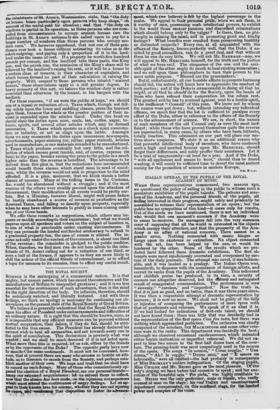THE ROYAL SOCIETY.
SCIENCE is the mainspring of a commercial nation. It is that mighty, but unseen power, which has raised thecommerce and the manufactures of Britain.to unequalled greatness ; and it is no less essential for the continuance of such advantages, than is the mind for the right direction of the body. Its inferests, therefore, should be sedulously watched, and liberally fostered. And with these feelings, we think no apology is necessary for continuing our ob- servations on the present state of the Royal Society of Great Britain. We believe it is generally understood that the Royal Duke enters upon his office of President under embarrassments and difficulties of no ordinary nature. It is right that this should be known, since, as it is impossible that any efficient measures can be pursued without mutual cooperation, their failure, if they do fail, should be attri- buted to the true cause. The President has already declared his earnest wish to heal, all animosities, and act towards every one in the spirit of conciliation. This declaration is precisely what was wanted ; and we shall- be much deceived if it is- not acted upon. What more than this is required, let us ask, either by the friends or by the opponents-of-the Duke? The opposite party have now to manifeet the same sentiments. It must not be concealed, how- ever, that at present There are many who aisume so hostile an atti- tude, as to threaten to. secede from the Society, and perhaps esta- blish another of their own. -We hope and trust that we shall have to renord no such doings. Many of those who conscientiously op- posed theelectionof. a Royal President, are our personal friendse-- Many. our esteerned acquaintance: let- us iiiitreat them to reflect, flow that thechnieerha.s, been marle,un the injurious consequences which must:Attend the continuance of -angry feelings. Let na ap- peal to their kinnVe love forscience, whether they areinot injuring Ca41104 .1344[4,14eliii4 that disposition to foster its advance- ::: naent, (we believe) is felt by the highest personage in the realm. We appeal to their personal pride, when we ask them, is it worthy of men, possessing such intellectual powers, to exhibit to the world those meaner passions and discordant criminations which should belong only to the vulgar? Is there, then, no phi- losophy in calming the mind, and in promoting good and kindly feelings ? What benefits ever resulted from persevering hostility or distracted councils? Every one, at all acquainted with the affairs of the Society, knows perfectly well, that the Duke, if as- sisted by good councillors, can do a great deal, and that without them he can do very little. We will ask Mr. BABBAGE—nay, we will appeal to Mr. HERSCHEL himself, for the truth and the justice of what we have said. The eloquence of the one and the ami- able spirit of the other might do much to heal existing animosities ; and we call upon these philosophers to turn their powers to the most noble purpose. "Blessed are the peacemakers." But if, unfortunately, all our humble efforts to promote harmony should fail, the nation will know how to appreciate the conduct of both parties ; and if the Duke is unsuccessful in .doing all that he might, or all that he should do for the Society, upon the heads of those who have refused their cooperation let the odium rest. The greatest evil he has to contend against, next to a hostile spirit, is the inefficient" Council" of this year. We know not by whom the names were put down ; but, without intending any individual offence, we much fear that the list is sufficient to paralyze every effort of the Duke, either in reference to the affairs of the Society or to the advancement of science. We see, in short, the names of such members of the old Council only as were the most inef- ficient ; while those who have proved themselves quite the reverse are superseded, in many cases, by others who have been, hitherto, totally inactive. This admission on our part will place our mo- tives above suspicion. We state it as an additional reason why that powerful intellectual body of members, who have conferred such a high and merited honour upon Mr. HERSCHEL, should forget their differences, and nobly proffer their assistance. Let it be a trial of magnanimity—at least for a year. And if the Duke, "with all appliances and means to boot," should then be found wanting, it will surely be sufficient time to desert the most ancient society for the promotion of science in modern Europe,
P.R. & L.S.


























 Previous page
Previous page